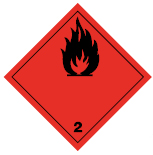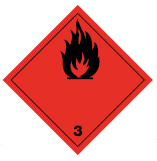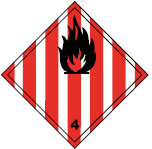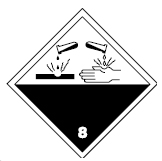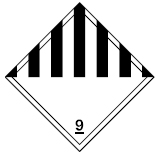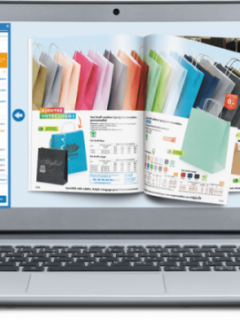The hazardous substance warning label is intended to draw attention not only to the hazardous contents of the shipment, but also to how the substance may harm the health of persons who come into contact with it or how it may disrupt the environment. Hazardous substances are classified into 9 hazard classes, which correspond to international regulations:
| Class 1 | Explosive substances and articles |
| Class 2 | Gases |
| Class 3 | Flammable liquids |
| Class 4 | Flammable solids, spontaneously ignitable substances which form flammable gases on contact with water |
| Class 5 | Flame retardants (organic peroxides) |
| Class 6 | Poisonous (toxic) and infectious substances |
| Class 7 | Radioactive substances |
| Class 8 | Corrosive substances |
| Class 9 | Other dangerous substances and articles |
Each commodity has a different hazard symbol. In the Rajapack shop you will find 9 types of warning labels for marking hazardous substances on shipments:
This label is ideal for labelling gases and substances that are completely gaseous at room temperature of 20°C and a pressure of 1013 mbar, and reach a pressure of up to 3 bar at elevated temperatures, such as hairsprays, lighters, deodorants, gas cylinders, etc.
These liquids are completely liquid at a temperature of 20°C and a pressure of 1013 mbar, reaching pressures of up to 3 bar at elevated temperatures, with a flash point above 60°C. These are e.g. alcohol, hydrogen cyanide, pesticides, gasoline, degreasers, disinfectants, varnishes, etc.
Labels with this hazard symbol also indicate a fire hazard (Class 4) and are required for the transport of spontaneously decomposing substances, desensitized explosives or other easily flammable substances such as various oily or powdery products that will ignite rapidly on contact with fire or other sources.
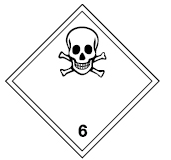 Label “Poisonous, toxic substances”
Label “Poisonous, toxic substances”
The label must be used for all substances that can lead to death if inhaled, ingested or in contact with the skin. This is hazard class 6 and includes, for example, hydrogen cyanide, pesticides, arsenic.
Corrosive substances are all substances that etch the skin or mucous membranes on contact. This type is classified in hazard class 8 and refers to disinfectants, drain cleaners, sulphuric acid, caustic soda, cement.
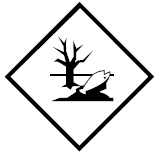 “Environmentally hazardous substances” label
“Environmentally hazardous substances” label
In this case, substances that are harmful to the environment, harmful to animals, plants, soil and aquatic organisms. For example: sulphuric acid, hydrocyanic acid, caustic soda, pesticides, arsenic, petrol.
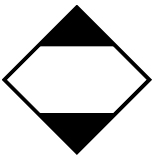 Label ‘Dangerous even in small quantities’ (in road, rail and sea transport)
Label ‘Dangerous even in small quantities’ (in road, rail and sea transport)
In limited quantities, this logo is sufficient. The packaging does not have to be certified as dangerous goods packaging, but must meet certain prescribed requirements. Applies to all dangerous goods. E.g. aerosols, paints, varnishes.
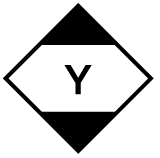 Label “Dangerous even in small quantities” (in air transport)
Label “Dangerous even in small quantities” (in air transport)
In limited quantities, this logo is sufficient. The packaging does not have to be certified as dangerous goods packaging, but must meet the requirements for palletising boxes. The permissible container sizes are smaller than for road, rail and sea transport. It applies to all types of dangerous goods and is therefore associated with a certain hazard class. Again, this includes various aerosols, paints, varnishes.
Label “Other dangerous substances and articles”
Warning labels with this hazard symbol are used to label materials and objects that may pose a risk during transport and are not covered by other hazard classes e.g.: lithium batteries, airbags, asbestos, dry ice.
We hope that this clear summary provides you with important information on hazardous materials and cargo labeling and wish you safe hazardous shipping!











